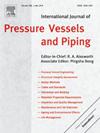Investigation of the evolution of welding residual stress in A350-LF2 steel multi-layer and multi-pass joint
IF 3
2区 工程技术
Q2 ENGINEERING, MECHANICAL
International Journal of Pressure Vessels and Piping
Pub Date : 2025-03-08
DOI:10.1016/j.ijpvp.2025.105501
引用次数: 0
Abstract
For multi-layer and multi-pass welding (MMW), two different structural layers, including the upper fine-grained layer caused by the reheating effect of the subsequent weld passes and the lower coarse-grained layer determined by the peak temperatures of the current thermal cycle, are likely to generate in most weld passes (except for the final one). In this study, to explore the formation and evolution of the welding residual stress (WRS) in MMW joint, a finite element model considering the thermo-metallurgical-mechanical interaction effects was developed to calculate WRS. Then a novel heat conduction model was proposed to quantitatively estimate the reheating effect. The effectiveness of the above models was verified by the experimental measurements. Then Satoh test was further performed to explore the effects of the peak temperature, phase transformation, and reheating on WRS evolution. The results demonstrate that the formation of WRS in MMW joint is similar to a multilayer residual stress stacking, which is mainly influenced by not only the peak temperature of the welding thermal cycle but also the reheating effect of the weld passes and consequent phase transformation. In the event of the peak temperature of the welding thermal cycle being in the range of Ac1 to Ac3, the mixture phase with relatively higher yield strength tends to be generated in the reheated layer in weld passes, as a result, the welding residual tensile stress in MMW joint can be decreased.
A350-LF2钢多层多道次接头焊接残余应力演变研究
对于多层多道次焊接(MMW),除最后一道道次外,大多数焊道都可能产生两种不同的结构层,即由后续焊道的再加热效应产生的上层细晶层和由当前热循环峰值温度决定的下层粗晶层。为了探讨毫米波接头焊接残余应力的形成与演变,建立了考虑热-冶金-力学相互作用的有限元模型,对残余应力进行了计算。在此基础上,提出了一种新的热传导模型来定量评价再加热效果。实验结果验证了上述模型的有效性。然后进一步进行Satoh试验,探讨峰值温度、相变和再加热对WRS演化的影响。结果表明:毫米波接头WRS的形成类似于多层残余应力的堆积,其主要影响因素除了焊接热循环的峰值温度外,还包括焊道的再加热效应和随后的相变。当焊接热循环的峰值温度在Ac1 ~ Ac3范围内时,在焊接道次的再加热层中容易产生屈服强度较高的混合相,从而降低毫米波接头的焊接残余拉应力。
本文章由计算机程序翻译,如有差异,请以英文原文为准。
求助全文
约1分钟内获得全文
求助全文
来源期刊
CiteScore
5.30
自引率
13.30%
发文量
208
审稿时长
17 months
期刊介绍:
Pressure vessel engineering technology is of importance in many branches of industry. This journal publishes the latest research results and related information on all its associated aspects, with particular emphasis on the structural integrity assessment, maintenance and life extension of pressurised process engineering plants.
The anticipated coverage of the International Journal of Pressure Vessels and Piping ranges from simple mass-produced pressure vessels to large custom-built vessels and tanks. Pressure vessels technology is a developing field, and contributions on the following topics will therefore be welcome:
• Pressure vessel engineering
• Structural integrity assessment
• Design methods
• Codes and standards
• Fabrication and welding
• Materials properties requirements
• Inspection and quality management
• Maintenance and life extension
• Ageing and environmental effects
• Life management
Of particular importance are papers covering aspects of significant practical application which could lead to major improvements in economy, reliability and useful life. While most accepted papers represent the results of original applied research, critical reviews of topical interest by world-leading experts will also appear from time to time.
International Journal of Pressure Vessels and Piping is indispensable reading for engineering professionals involved in the energy, petrochemicals, process plant, transport, aerospace and related industries; for manufacturers of pressure vessels and ancillary equipment; and for academics pursuing research in these areas.

 求助内容:
求助内容: 应助结果提醒方式:
应助结果提醒方式:


